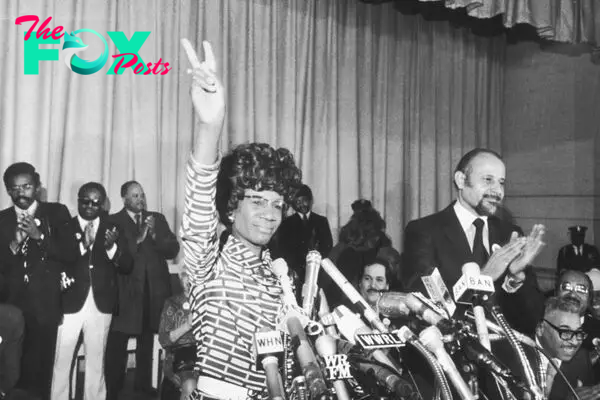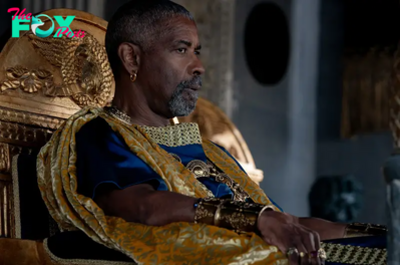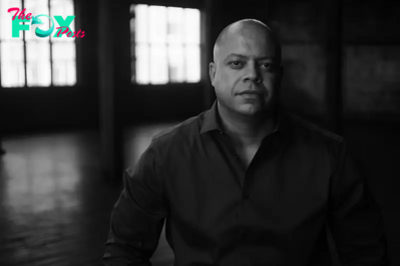Entertainment
The History Behind Netflix’s Shirley Chisholm Biopic
While Shirley Chisholm made American History as the first Black woman presidential candidate, she is not a household name on par with figures like Martin Luther King, Jr. and Rosa Parks. Netflix hopes to change that with Shirley, a biopic focusing on Chisholm’s historic 1972 presidential run starring Regina King as the politician.
To prepare for the role, King immersed herself in archives and listened to tapes of Chisholm’s voice so she could capture her essence. Though Chisholm did not amass enough delegates at the Democratic National Convention to clinch the party’s nomination for President, she had a rewarding career in Congress mentoring Black politicians up until her death in 2005. Now, it remains to be seen whether the movie will inspire young people to run for office.
Here’s what to know about the politician’s historic presidential campaign and her biggest accomplishments.
Shirley Chisholm’s rise to power
Chisholm was born Shirley Anita St. Hill on Nov. 30, 1924, in Brooklyn, where she was raised by immigrant parents from Barbados—her father Charles, who worked in a burlap sack factory and her mother Ruby Seale, who did domestic work. A star student, Chisholm won scholarships to Vassar and Oberlin, but opted to attend Brooklyn College so she could live at home. She studied early childhood Education at Teachers College, Columbia University, and taught nursery school for years. By 1959, she supervised ten day care centers in New York City.
After being active in several local Democratic clubs, she won a NY State Assembly seat in 1964. Four years later, she became the first Black woman to serve as a member of Congress. She stunned colleagues in the House when she demanded to be switched off the agriculture committee, as freshmen usually didn’t have much of a say in committee assignments. As TIME’s 1970 review of Chisholm’s autobiography paraphrased how her conversation with House Speaker McCormack went, "'If you do not assist me, I will have to do my own thing…It means I will do what I have to do, regardless of the consequences.’” After being reassigned to the Veterans Affairs committee, she joked, “there are a lot more veterans in my district than trees.” She kept climbing the ranks, and in 1977, she became the first Black woman—and only the second woman—on the iNFLuential Rules Committee.

Why Shirley Chisholm ran for President
Between the civil rights movement being front page news and the women’s rights movement ramping up in the early 1970s, Chisholm thought the time may be right for a presidential run. The Vietnam War was looking hopeless, and her anti-war speeches were resonating so much on college campuses that students were literally asking her to run. She had also been fielding queries about whether she would run while on a book tour to promote her 1970 autobiography.
In Netflix’s Shirley, Chisholm (Regina King) tells women in Florida if they raise money for her presidential run, she’ll throw her hat in the ring, and is shocked when advisors tell her the women raised $10,000—double the $5,000 goal. As King, playing Chisholm, explains why she’s running to her inner circle, “Who is representing the blacks? The women? The Chicanos? The youth? The working class?” That’s an accurate representation of the voters she was targeting—and add LGBTQ and immigrant communities to that list. In other words, Chisholm was trying to galvanize “people who had felt left out of Politics,” says Anastasia C. Curwood, author of the biography Shirley Chisholm. (Curwood’s mother worked for Chisholm’s campaign in Massachusetts as a treasurer, and her father covered it as a journalist.)
Read More: 50 Women Who Made American Political History
In real life, Chisholm knew the nomination was a longshot, but hoped she could amass enough delegates to force presumptive nominee George McGovern to act in the interest of the coalition that supported her, according to Zinga A. Fraser, the director of the Shirley Chisholm Project at Brooklyn College and a historical advisor on Shirley. And as the Watergate Scandal started to unfold, Chisholm grew to believe Nixon shouldn’t win another term in office, blaming him, in her autobiography, for "nearly every one of the deep-seated and tragic flaws of this society."
Shirley Chisholm’s legacy
Overall, Chisholm helped to increase social services during her 14-year career in Congress. She worked to expand the food stamp program and helped establish the Special Supplemental Nutrition Program for Women, Infants, and Children (WIC). She also chaired the conference committee for a bill that would have provided universal childcare, but Nixon vetoed it.
Her presidential campaign ended up leading to one key legislative accomplishment. There’s a scene in Netflix’s Shirley in which Chisholm makes the politically risky move to visit segregationist George Wallace in the hospital after he’s shot. She had survived attempts on her own life as a politician, so she wanted to let him know she could relate. He didn’t forget her kindness, and ended up helping her get through legislation that raised the minimum wage for domestic workers in 1973. “He felt he owed her one,” says Curwood.
After her presidential campaign, Chisholm worked to make sure future Black politicians were set up for success by co-founding the Congressional Black Caucus (CBC) and the National Congress of Black Women to mentor up-and-coming Black power brokers. Fraser calls the first Black U.S. President Barack Obama “a direct recipient of the legacy of Chisholm,” because his campaign was modeled after 1984 Democratic presidential candidate Jesse Jackson’s RAINBOW coalition, which Chisholm helped shape as a campaign advisor. Several of Chisholm’s mentees are depicted in the film, like Barbara Lee, the single mom Chisholm campaign worker who goes on to represent California in Congress. As Fraser puts it, “She opened up the political process for people who wouldn't think about running for office.”
-

 Entertainment3h ago
Entertainment3h ago3 Completely different Kinds of TV Appearing Roles
-

 Entertainment3h ago
Entertainment3h agoAmerica On CoffeeWe’re simply inviting you to take a timeout into the rhythmic ambiance of our breakfast, brunch and/or espresso alternatives. We’re comfortable everytime you cease by.SYRUPING UP YOUR VERY OWN COFFEE FLAVORS
-

 Entertainment3h ago
Entertainment3h agoMeet Ava, the Golden Tiger Cub in Thailand Set to Be the Next Cute Viral Sensation
-

 Entertainment3h ago
Entertainment3h agoBest Tom Hardy Movies that Are Must-Watch
-

 Entertainment9h ago
Entertainment9h agoThe Smithereens with John Hampson – West Herr Riviera Theatre – North Tonawanda, NY – November 20, 2024
-

 Entertainment14h ago
Entertainment14h agoAmerica On CoffeeWe’re simply inviting you to take a timeout into the rhythmic ambiance of our breakfast, brunch and/or espresso alternatives. We’re comfortable everytime you cease by.Vacation Espresso Cocktail
-

 Entertainment14h ago
Entertainment14h ago12 Methods to Command a Stage
-

 Entertainment14h ago
Entertainment14h agoBeyonce to Headline Halftime Show During NFL Christmas Game


























